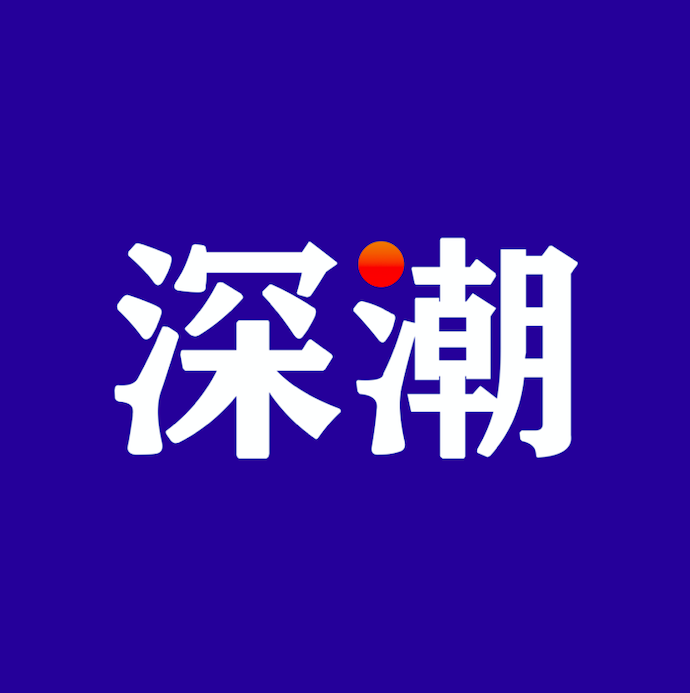Original author: Leo Park Yoon Lee
Original translation: TechFlow
Summary of key points:
Those global mainnets that entered the Korean market early are still very active, especially in the gaming field, and they have demonstrated strong competitiveness around entertainment IP.
This year, mainnet projects such as Arbitrum, Monad, Story, and Scroll have rapidly expanded their influence in South Korea. Each project has adopted a unique strategy, focusing on community building, education, and strategic partnerships to grow its ecosystem.
While the Korean market is certainly attractive, in-depth understanding of its language, culture and regulatory environment is essential. Early collaboration with local partners is key to successfully entering and adapting to the market.
1. Introduction
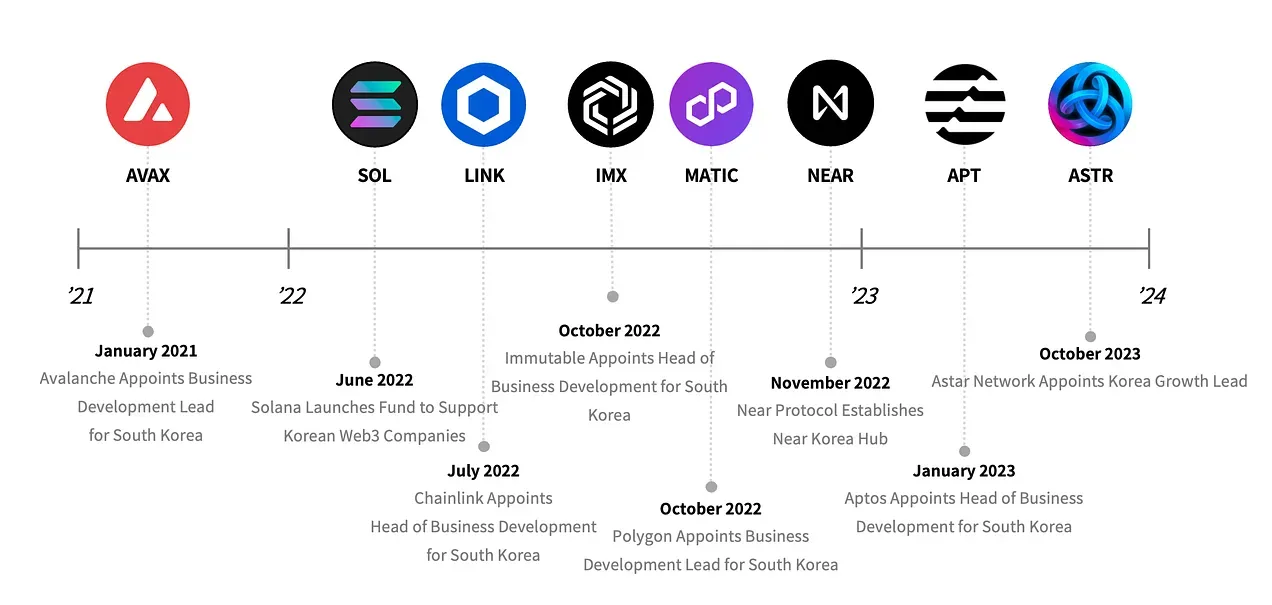
Source: Tiger Research
Since 2022, global blockchain mainnets have actively explored the Korean market by appointing local representatives and cooperating with Korean companies. It is worth noting that several blockchain networks, including Avalanche, have made significant progress. Avalanche officially announced its entry into the Korean market in 2021 by appointing a head of business development. Solana, Polygon, Aptos, and Astar have also made important breakthroughs in the Korean market.
However, with the rapid development of the Web3 industry, some of their strategies have also been adjusted. This report aims to explore whether these mainnets are still focused on the Korean market and identify whether there are emerging mainnets. Through this analysis, we hope to reveal how these mainnets seize opportunities and formulate their strategies in the Korean market.
2. Current status of mainnet expansion in South Korea
[Current trends of mainnet entering the Korean market, Tiger Research]
The table contains 3 columns and 20 rows, sorted by the Current Status column in ascending order.
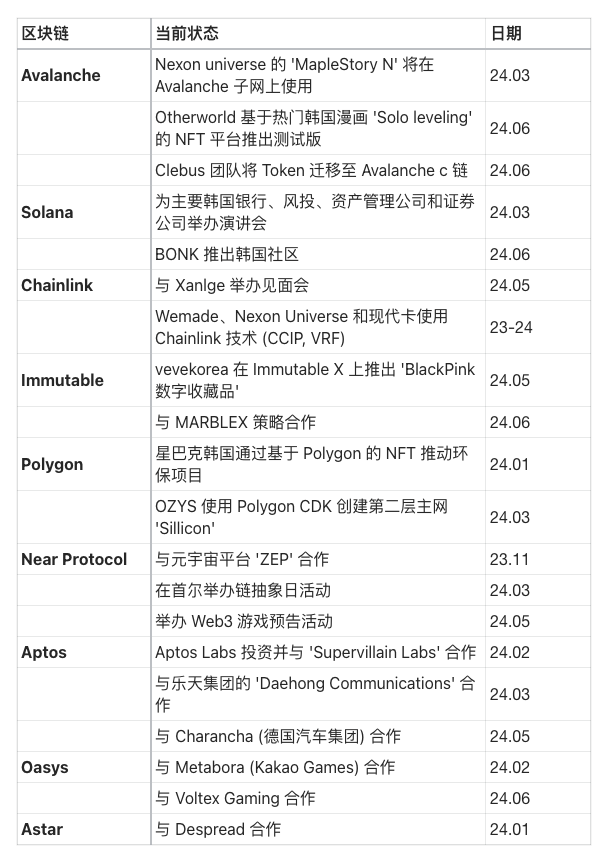
2.1. Focus shifted to project introduction
The global blockchain mainnets that entered the Korean market early have now begun to show substantial results. These networks are not limited to simple cooperation with Korean companies, but are more focused on business development and are committed to introducing high-quality projects.
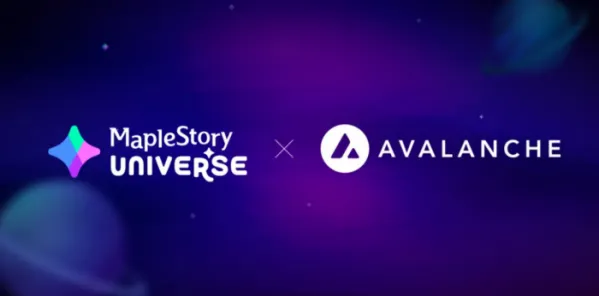
Source: Nexpace
For example, Avalanche successfully integrated Nexpaces MapleStory N into its subnet, becoming a notable integration case. In addition, Avalanche further strengthened its ecosystem and expanded its influence in South Korea by incorporating SK Planets NFT membership platform Road to Rich.
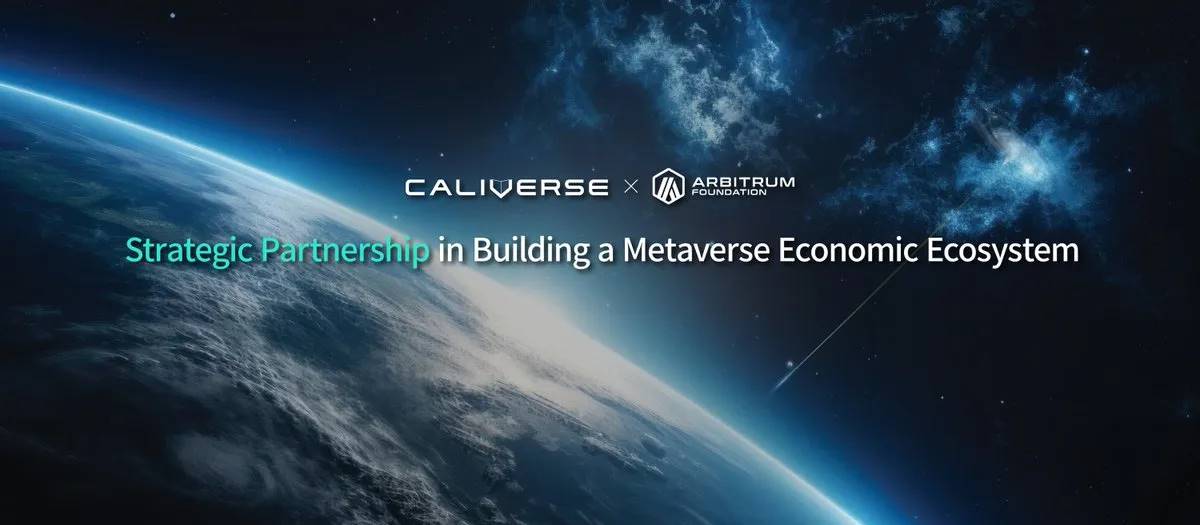
Source: Arbitrum
Arbitrum appointed a Korean head and established the Arbitrum Korea community in 2023 to consolidate its ecological foundation. The network partnered with Delabs to bring their Web3 games to Arbitrum and integrated Lotte Groups metaverse platform Caliverse, showing its firm commitment to revitalizing the Korean ecosystem.

Source: Marblex
Immutable is strengthening its cooperation with Web3 game company Marblex, Aptos is introducing Supervillain labs , and Polygon has successfully completed an NFT-based environmental protection project in cooperation with Starbucks Korea. These cases show that the blockchain mainnet is not only establishing partnerships, but also realizing substantial real-world applications in the Korean market.
2.2. Are we waiting for the right opportunity or falling behind in the competition?
While some mainnets are gradually introducing projects in their respective fields, others appear to be more passive. For example, since the establishment of the Near Korea center, Near Protocol has not made significant progress except for establishing partnerships and hosting events. Similarly, other mainnets mostly stay at surface cooperation and lack in-depth interaction. In addition, networks like Oasys have weakened their vitality in the Korean market, partly due to the departure of key business development personnel.
3. Global blockchain mainnet entering the Korean market in 2024
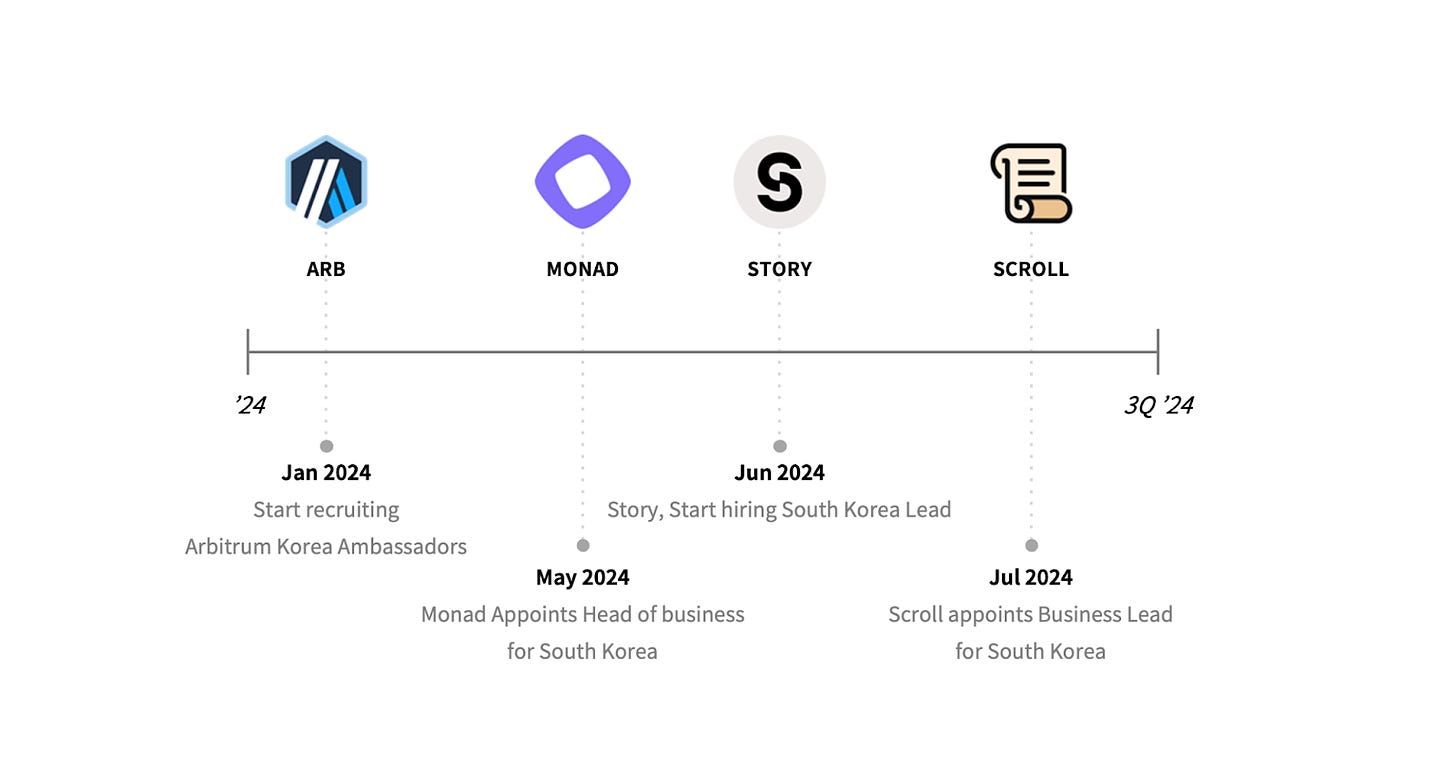
Source: Tiger Research
In 2024, global mainnets continue to demonstrate their influence in the Korean market, each with their own unique approach. These efforts include building a strong community, conducting training activities, organizing various events, and increasing awareness, while seeking ecosystem partners to consolidate their market position. In this chapter, we will explore those mainnets that have recently begun to expand their ecosystems in Korea and provide insights into their ongoing activities.
3.1. After all, Web3 starts with the community
Community is at the core of any Web3 project, and this is no exception for the mainnet entering the Korean market.
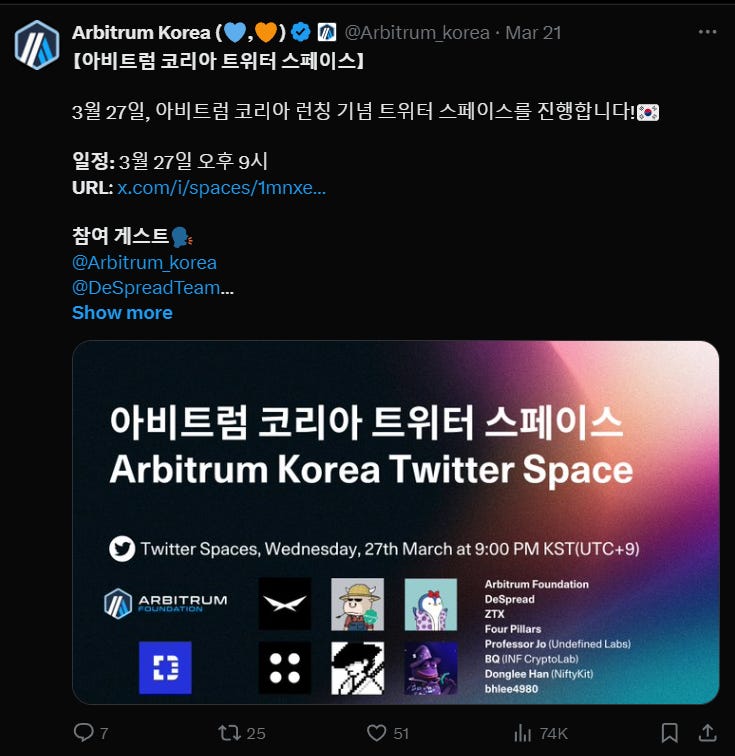
Source: Arbitrum Korea X
For example, Arbitrum has established a local community in South Korea called Arbitrum Korea to promote its expansion in South Korea. Arbitrum Korea actively works with ambassadors and local partners to enhance its local presence. These ambassadors play an important role by translating Arbitrum’s ecosystem updates into Korean and disseminating them on major channels. They also organize events such as conversations on Twitter Spaces with well-known Korean personalities to increase awareness and engagement in the Korean market.
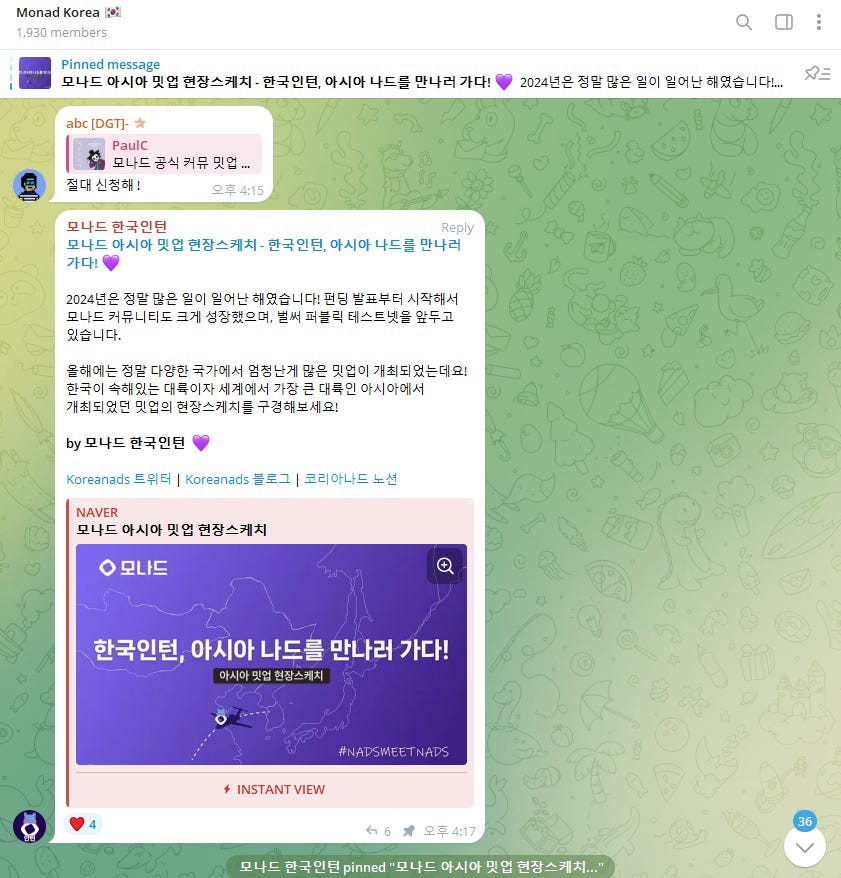
Source: Monad Telegram
In addition, Arbitrum has opened a Telegram channel specifically for South Korea to publish ecosystem news and interact with community members. This channel not only attracts blockchain developers, but also investors who want to understand the dynamics of the mainnet. These initiatives are aimed at overcoming the barriers brought by language differences, cultural differences, and different search engine platforms in different countries, thereby promoting more people to participate in the ecosystem.
3.2. Expanding the ecosystem through education and events
There are many different types of blockchain technologies in the Web3 industry, and they are all structured differently. While the degree of differentiation varies, in many cases they operate in very different ways due to the architecture of the infrastructure or the programming language used. This has led to a fragmented developer ecosystem, making the development of the entire ecosystem and the process of introducing companies and projects into the ecosystem challenging.
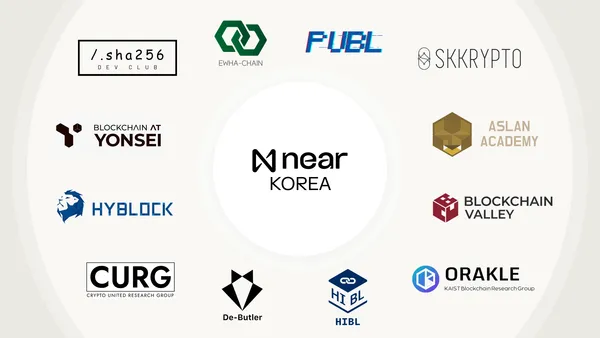
Source: Near Korea Hub
Mainnets around the world are increasingly recognizing the important role of education in building a strong blockchain ecosystem. In this context, Near Protocol has established strategic partnerships with 12 blockchain societies in South Korea to promote educational programs and hackathons. Similarly, Arbitrum Korea has also partnered with blockchain societies at Korea University and Yonsei University to host workshops aimed at enhancing students understanding of Arbitrum technology. These efforts reflect the strategic importance of the Korean market, beyond its potential as a retail investment market. The emphasis on cultivating and attracting high-quality talent highlights South Koreas central role in the broader blockchain ecosystem. By investing in education and community-building activities, these mainnets are effectively laying the foundation for growth and innovation in the ecosystem.
3.3. Ecosystem partners
Global mainnets not only focus on training their own developers, but also strategically expand their ecosystems through partnerships with local companies. For example, Monad has partnered with Neowiz’s Intellar X to enhance its presence in Pacific markets, including South Korea. Similarly, Arbitrum has joined forces with Delabs, a local South Korean Web3 gaming company, to facilitate the introduction of gaming projects and further enhance its ecosystem. These partnerships demonstrate a targeted approach to market expansion using local expertise and industry-specific collaborations.
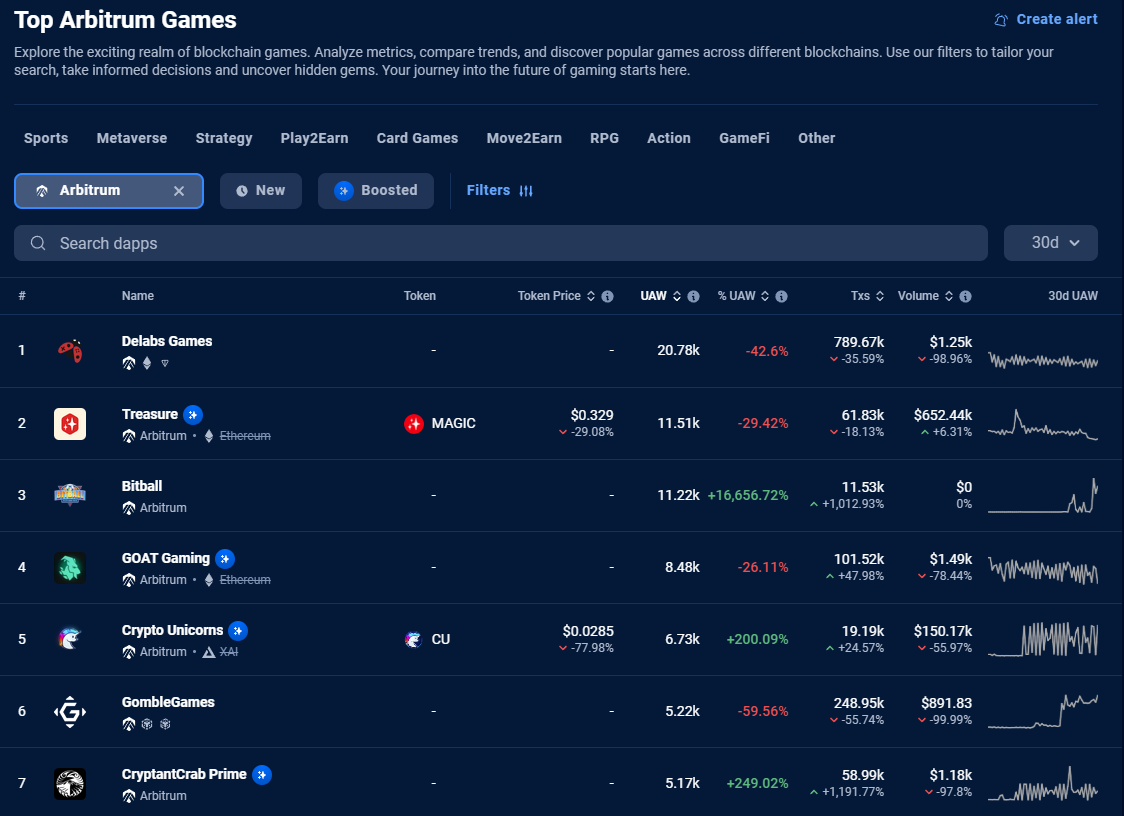
Source: DappRadar
Therefore, the mainnet is expanding the market with the help of strong local partners. Especially in the Korean market, they focus on establishing partnerships with promising gaming companies. In addition, they are also expanding the ecosystem by cooperating with infrastructure providers such as local wallets and validators. These collaborations help overcome cultural and social barriers, allowing the mainnet to enter the market more quickly and efficiently.
4. Conclusion
As of 2024, the growth of the Web3 industry in South Korea has slowed due to the implementation of the Virtual Asset User Protection Act and the stagnation of security token offering (STO) regulation. Despite these regulatory challenges, South Korea remains an attractive market with its significant liquidity and high-quality developer base. Major mainnets are still maintaining a stable market presence and actively exploring various strategies to enter the Korean market.
4.1. Steps to a successful market entry
Global mainnets usually raise awareness by hiring Korean representatives and holding events and educational programs. They then create actual success stories based on the accumulation of market influence through cooperation with major local partners. Another key feature is that they focus on content-oriented projects and cooperation. This seems to be a feature of the Korean market, which is very developed in the field of intellectual property such as games, comics, novels and idols.
4.2. Key points for successful penetration of the Korean market
To effectively expand their business in Korea, most global mainnets usually hire local representatives . However, challenges may arise when these representatives are responsible for the wider Asian market or are not familiar enough with the Korean language and culture. Koreas rapid economic development and unique market characteristics require representatives to have a deep understanding of local culture and be fluent in Korean.
In addition, it is important to navigate the ever-changing cryptocurrency regulations and their associated political and social dynamics. In order to successfully enter and gain a foothold in the market, it is recommended to work with a local partner who is familiar with Korean culture, industry characteristics, and regulatory framework as early as possible.

